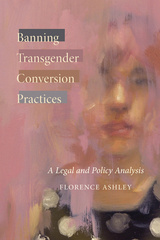
Troubling Sex
Towards a Legal Theory of Sexual Integrity
When legal scholars or judges approach the subject of sexuality, they are often constrained by theoretical frameworks and disciplinary boundaries. For instance, queer theorists focus on sexual liberty and the rights of sexual minorities but tend to ignore troubling issues such as sexual violence. Feminist theorists focus on sexual violence but often fail to recognize the joy of sexuality.
Elaine Craig explores the possibility of devising a legal theory of sexuality that embraces both the good and the bad – a theory that ensures equality without assimilation, diversity without exclusion, and liberty without suffering. Her reading of the Supreme Court of Canada’s approach to sexuality in a wide range of cases – sex work, sexual violence, child and gay pornography, and discrimination claims based on sexual orientation – reveals that judges maintain an essentialist understanding of sexuality that limits legal remedies and renders certain harms invisible. However, the Court’s feminist-inspired approach to sexual violence, which recognizes the socially constructed nature of sexuality, holds the promise of producing legal reasoning that can both protect and promote sexual integrity as a common interest.
Blending feminist theory with the inclusiveness of queer theory, Craig advances an iconoclastic approach to law and sexuality that has the power to transform both theory and practice.
This book will be of interest to students and scholars of law, sexuality and gender studies, feminist legal studies, and cultural studies.
Elaine Craig’s book contributes significantly by studying sexuality transversally, across legal fields normally seen as distinct. Through provocative readings of leading cases, grounded in feminist and queer theory, it shows how the Supreme Court’s judgments embody different approaches from one field to another.
In this ambitious and thought-provoking work, Craig pulls into conversation the divergent threads in the Supreme Court’s exploration of sexuality: sexual assault, sexual expression, sexual harassment, sexual equality. She makes visible the tensions present in law’s struggles to distinguish between good sex and bad sex, public sex and private sex, dominant sexual practices and minority sexual practices, assimilation and tolerance, suffering and desire. Drawing on theoretical resources from across the spectrum, Craig offers a refreshingly iconoclastic approach to pressing political and moral questions about sexual integrity as a common good.
Introduction
1 Essentialism and Constructivism in Law
2 Legal Conceptions of Sexual Nature and Natural Sex
3 Natural Categories and Non-Categorical Approaches to Law and Sexuality
4 Socially Constructed Conceptions of Sexual Violence
5 A Moral Shift
6 Some Subjective Truths About the Objective Truth of Sex
7 Trouble Ahead: An Iconoclastic Approach to Sexual Integrity in the Law
Notes
Bibliography
Index







